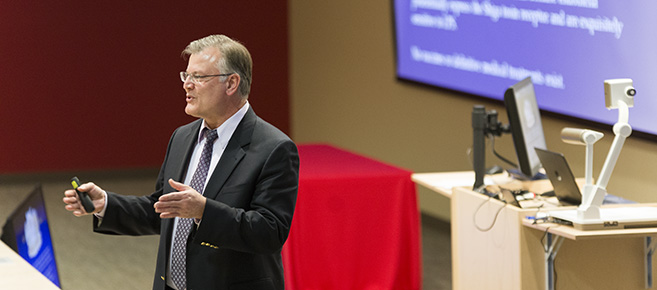Wednesday, February 18, 2015
Center for Research launches seminar series
Sat, 17 Jan 2015Troy Burnett :: LUCOM Marketing & PR

On January 15, the Center for Research at Liberty University College of Osteopathic Medicine (LUCOM) announced its presence by hosting the initial session of the Biomedical Frontiers Seminar Series.
Lead by Joseph Brewer, Ph.D., Associate Dean for Research, this planned monthly series features medical and research professionals reporting on the latest medical advances and research in their fields of practice and research.
“With this particular series of seminars we want to exhibit the vast body of research and the innovative practices that LUCOM faculty has contributed to the advancement of medical science and care. Our hope is to not only educate but also stimulate interest among students and professionals at LUCOM, Liberty University, and in our professional communities in advancing medical research,” said Dr. Brewer.
In this first installment of the seminar series, Anthony Bauer, Ph.D., Associate Professor in the Department of Integrative Physiology and Pharmacology, and Carl Hoegerl, D.O., Chair and Assistant Professor of Neurology in the Department of Internal Medicine, gave brief presentations on their current research activities.
Preceding a brief introduction and prayer lead by Dr. Brewer, Dr. Bauer began the seminar with his presentation entitled Immune Modulation of Gastrointestinal Function. Dr. Bauer, who came to LUCOM from Eastern Virginia College of Medicine, presented information on postoperative ileus, obstipation and intolerance of oral intake secondary to disruption of the normal coordinated propulsive motor activity of the gastrointestinal tract.
Presenting evidence that Shiga toxin, a family of related toxins expressed by genes considered to be part of the genome of lambdoid prophages, affects the small blood vessels found in the digestive tract with the potential to spread to the kidneys and lungs. Dr. Bauer noted the wide epidemiology of the toxin, “This agent affects more than 150 million individuals each year. It causes more than a million deaths annually.”
Dr. Bauer also shared, “My initial interest in this research started with two simple questions: ‘Why can’t you feed people when they are sick?’ and ‘Why do they die?’” Those questions of course developed many more questions and along with those questions came fascinating discoveries. I never expected to develop such detailed research from just those two founding questions.”
Dr. Hoegerl, a graduate from Philadelphia College of Osteopathic Medicine, presented information derived from his stroke intervention research completed while training at Geisinger Medical Center. During the project, he found that if tissue plasminogen activator (tPA) treatment is administered within the first three hours of the onset of stroke symptoms, much of the damage associated with the condition could be prevented. Clinically significant findings indicate more than 700,000 Americans suffer from stroke, annually.
Dr. Hoegerl further explained, “Although the importance of tPA treatment is now well established, there remain issues administrating the therapy to every patient within the recommended time frame. Recognition of symptoms of the stroke early by the patient or their family, the waiting time for the patient to be seen in the ED or hospital, diagnosis of the condition and obtaining the required history, CT or MRI studies to rule out hemorrhage, drastically narrows the window of time available to administer the treatment with maximum benefits. Through the project, we were able to propose solutions for hospitals narrow the windows of time and expedite patient treatment.”
Dr. Hoegerl concluded his presentation by delivering a message to the LUCOM student-doctors in attendance, “Before I began my research, I purposed myself to conduct research that would be patient-centered. Essentially, I want my research to benefit my patients.” He continued, “In practice and research, there are two choices: you can either practice medicine the way you were taught, or you can teach medicine the way it should be practiced.”
The Center of Research will continue its monthly presentations in the Biomedical Frontiers Seminar Series with events currently scheduled for Thursday, February 19, March 19, and April 16 at 5:30 p.m. The series is open to the public and all those interested in research with light refreshments served.